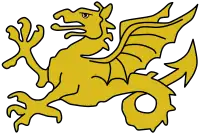wyvern
English

A wyvern
Etymology
Alteration of Middle English wyver (“viper”), borrowed from Old Northern French wivre, from Latin vīpera (“viper; snake, serpent”). Doublet of weever and viper.
Pronunciation
- enPR: wī'və(r)n, wĭ'və(r)n, wē'və(r)n, IPA(key): /ˈwaɪvə(ɹ)n/, /ˈwɪvə(ɹ)n/, /ˈwiːvə(ɹ)n/
Audio (Southern England) (file) Audio (Southern England) (file) Audio (US) (file)
- Rhymes: -aɪvə(ɹ)n, -ɪvə(ɹ)n, -iːvə(ɹ)n
Noun
wyvern (plural wyverns)
- (heraldry, mythology, fantasy) A draconian creature possessing wings, only two legs and usually a barbed tail.
- 1814 July 7, [Walter Scott], Waverley; or, ’Tis Sixty Years Since. […], volumes (please specify |volume=I to III), Edinburgh: […] James Ballantyne and Co. for Archibald Constable and Co.; London: Longman, Hurst, Rees, Orme, and Brown, →OCLC:
- 1940-54 The Collected Poetry of Malcolm Lowry, "WE SIT UNHACKLED DRUNK AND MAD TO EDIT", UBC Press,1992, p.222:
- Notions of freedom are tied up in drink / Our ideal life contains a tavern / Where man may sit and talk of or just think / All without fear of the nighted wyvern, / Or yet another tavern where it appears.
Translations
mythical dragon-like creature
|
This article is issued from Wiktionary. The text is licensed under Creative Commons - Attribution - Sharealike. Additional terms may apply for the media files.